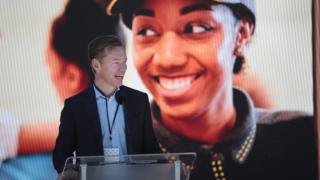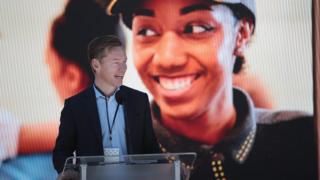Execs accuse McDonald’s of racial discrimination
Two women are taking legal action, claiming a “pattern and practice of intentional race discrimination”. …

 Image copyright Getty Images
Image copyright Getty Images Two senior McDonald’s executives have filed a lawsuit against the company, accusing it of discriminating against African-American customers and staff.
They say the climate grew especially hostile after UK-born Steve Easterbrook became chief executive in 2015.
Under his leadership, they say the firm “conducted a ruthless purge” of high-ranked African-Americans and shifted advertising away from black customers.
McDonald’s said: “We disagree with characterisations in the complaint”.
The firm said it has reduced the number of “officer level” positions over the last five years but that people of colour account for 45% of the firm’s corporate officers – an increase since 2013 – and all of its 10 field vice-presidents in the US.
Last year, it launched a marketing campaign aimed at African Americans that was its largest in 16 years, it added.
“At McDonald’s our actions are rooted in our belief that a diverse, vibrant, inclusive and respectful company makes us stronger,” the company said.
Mr Easterbrook, who is named in the complaint, was fired last year for a mutual romantic relationship with a colleague in violation of company rules. He could not be reached for comment.
Mr Easterbrook was replaced by Chris Kempczinski, who previously headed McDonald’s US division and is also named in the complaint.
The lawsuit was filed on Tuesday in federal court in Illinois by Vicki Guster-Hines and Domineca Neal. The two women have worked at McDonald’s since 1987 and 2012 respectively and are both vice presidents for franchising and operations.
They say McDonald’s practised “systematic but covert” racial discrimination “over the years” but it became “overt, unmistakable, non-coincidental and highly damaging” after the 2015 leadership change.
In the complaint, they cite the shelving of training programmes for African Americans, the exclusion of African Americans from the ranks of senior advisors, and descriptions of colleagues as “Angry Black Women”.
They say that the number of black-owned franchises also declined disproportionately – departures they argue were either “intentional” or due to the company’s “reckless disregard” for the cost of some of the investments it demanded of franchise owners.
They also accuse the firm, which has been pursuing a broader campaign to refurbish stores and upgrade its image, of shifting advertising away from black customers, historically some of the company’s strongest patrons.
“As a consumer block, African Americans were singled out as less desired by McDonald’s,” they say.
The two women are seeking damages from the firm, which they say retaliated against them for voicing their concerns about the treatment of African Americans.



